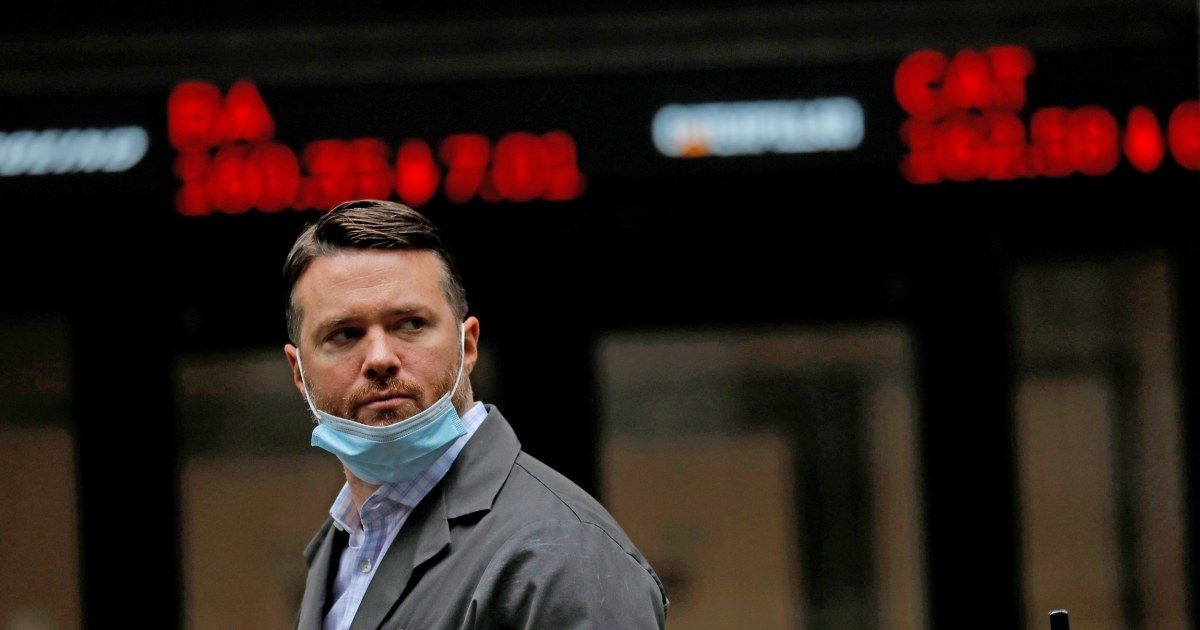
Wall Street’s norm-busting, record-shattering wild year has left market observers no less eager to prognosticate on what lies ahead for stocks, and the economy at large, in 2021. What makes this year’s predictions so different from everything that came before is the magnitude of uncertainty that lies ahead.
“We now have a light at the end of the tunnel — we just need to get from here to there,” said Brad McMillan, chief investment officer for Commonwealth Financial Network. “We’re healing more slowly, but we’re still healing. The question really is, how much damage is being done right now?”
Stocks fell on Monday, the first trading day of 2021, as coronavirus infection rates continued to rise, prompting further restrictive measures and impacting businesses across the globe.
The Dow Jones Industrial Average fell by 664 points, with the S&P 500 and the Nasdaq Composite both down by just under 2.5 percent.
A pair of interlinked X factors — when the economy will return to some semblance of normal, and how much that new normal will resemble pre-pandemic life — are the greatest variables.
Some question whether sky-high valuations of tech companies and other firms that became pandemic-era darlings will be justified going forward. “Once individual stocks that benefited from the work from home, stay-at-home economy started to go up, it became a self-reinforcing frenzy of validation,” said Mitchell Goldberg, president of ClientFirst Strategy. “The more these stocks went up, the more people believed in them.”
Goldberg predicted a rotation of investors moving money out of work-from-home and tech sector companies and into more of what he categorized as “economy-reopening stocks” such as travel- and leisure-related.
Other market pros concurred. “You’ve actually seen some of the travel and pandemic-affected stocks pause their trajectory. I think there's a lot of room for those to play catch-up and outperform,” said Ross Mayfield, investment strategy analyst at Baird.
Mayfield suggested, though, that certain expectations of a rebound already have been baked into existing stock prices. “I think some of that growth has been pulled forward,” he said.
“To some extent, it seems like the market is pricing to perfection,” said Charlie Ripley, portfolio manager and senior investment strategist at Allianz Investment Management. “The economy isn't really going to take off until the second half of 2021.”
If job growth holds at its current level, it would take more than a year and a half to reverse the pandemic-inflicted damage, he estimated.
The risk of anything going wrong — in particular, anything that contributes to a delay in widespread vaccine distribution and inoculation — could scramble these optimistic assumptions. “We’re kind of assuming the vaccine is going to roll out, that we're not going to have issues with the supply chain and take-up,” McMillan said.
Market experts register some unease about monetary policy going forward: While there is general agreement that the Federal Reserve’s interventions restored stability and facilitated liquidity to markets last spring, managing inflation as the economy rebounds is the next big hurdle.
“I expect inflation to start to rise to a level that’s outside of the comfort zone of the Federal Reserve, and then the concern will be interest rates,” Goldberg said. “A sudden shift higher would cause a hiccup in the market. I think it’s a risk that people are not taking seriously enough.”
Meanwhile, investors seeking safe havens will continue to face the prospect of paltry returns. “Rates will continue to drift higher, but for an income investor, it’s going to be somewhat difficult for the foreseeable future,” Ripley said.
In the near term, analysts are keeping a wary eye on labor market indicators. “We’re going to have to watch job growth,” McMillan said.
It is reasonable to assume, he said, that once the economy recovers more broadly, employers will add jobs more quickly. If job growth holds at its current level, though, it would take more than a year and a half to reverse the pandemic-inflicted damage, he estimated.
Mayfield said a sharp uptick in the number of business closures, structural shifts in employment displacing large numbers of workers permanently — not to mention the epidemiological trajectory of the virus itself — could slam the brakes on forward market momentum.
“As an economic observer, it’s something to be mindful of — that kind of scarring can manifest itself in unexpected ways down the road, and those kinds of losses will take a lot longer to heal,” he said.
"ball" - Google News
January 05, 2021 at 01:21AM
https://ift.tt/3rUTzR9
Crystal ball is murkier than usual as Wall Street starts 2021 - NBC News
"ball" - Google News
https://ift.tt/39CKzGV
Shoes Man Tutorial
Pos News Update
Meme Update
Korean Entertainment News
Japan News Update
No comments:
Post a Comment